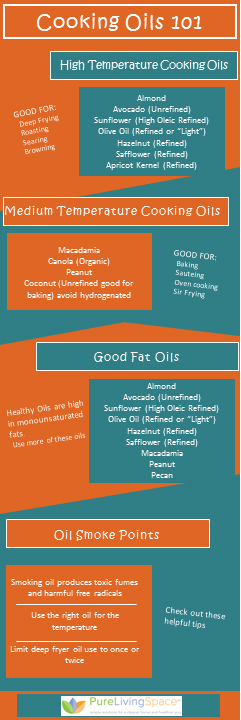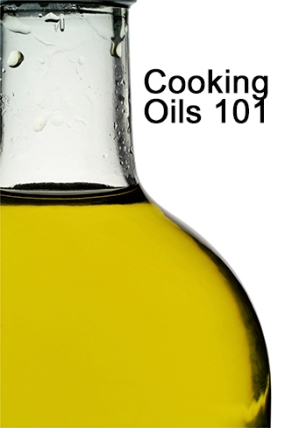Six Things Cooking Geeks Know About Cooking Oils That You Don’t
Argh! Why is it so confusing to pick the right oil for sauteing, baking or frying? Why is there so little consistency from one source to the next?
There’s so much conflicting advice. Some say to use palm oil while others tout coconut or safflower, and many proclaim the ills of butter. And then there’s the countless smoke point tables, and none match!
You are confused. Heating oil in a frying pan seems fraught with problems, and, of course, everything causes cancer.
But, if you rely on experts who really know their stuff – the real cooking geeks, you’ll be able to saute, bake, broil, braise, fry and roast with confidence.
Here are six things cooking geeks know about cooking oils that you don’t.
1. Cooking geeks understand the difference between Refined and Unrefined Oils
Refining oil raises its smoke point and lengthens shelf life; it creates a bland flavor and color which can be desirable for some dishes.
You may have heard that refined oils are unhealthy. A study that looked at the health benefits of vegetable oils concluded that there was little evidence to suggest that refining adversely affects the health benefits of vegetable oils.[1] The one exception noted by the study was olive oil. The study found that unrefined olive oil had more health benefits than refined olive oil.
So, based on this study, you can feel good about refined oils for high temperature cooking and your health. And you should use unrefined olive oil as a dressing or drizzle while reserving refined olive oil for cooking.
2. Cooking geeks know that smoke point tables are wrong
Yep, the smoke point tables are wrong. You shouldn’t believe the hundreds of smoke point tables in cookbooks and online because every oil is different depending on how it was refined, and the cultivation of the raw materials. For instance, some extra virgin olive oil makers list their smoke points from 200 to over 400 degrees.[2]
You can use some helpful guidelines though. Oils with high free fatty acids tend to have lower smoke points because the free fatty acids burn easily. On the other hand, refined oils generally have reduced amounts of free fatty acids and as a result, have higher smoke points.
3. Cooking geeks know the ill-effects of oils above smoke point
The smoke point is the temperature that causes oil to start smoking which produces toxic fumes and harmful free radicals–all things you’re trying to avoid.
If you’ve set off your smoke alarm, you’ve definitely reached the smoke point. Turn up your exhaust fan and open the windows.
By the way, always try to use your exhaust fan since cooking can create some unhealthy fumes, and your place will simply smell better.
4. Cooking geeks know the effects of reusing or long heat times on oils
The longer oil is heated, the more free fatty acids are formed causing the smoke point to drop which is why you want to limit deep fryer oil use to once or twice. Prolonged heating also breaks apart unsaturated fatty acids and produces acrid and toxic compounds.[2]
Neither is desirable.

5. Cooking geeks know which Oils are high in Omega 3 & Monounsaturated Fats (both good)
Looking for ways to increase your intake of Omega 3? Try Unrefined Flax Oil (for cold use only) or Hemp Oil.
Here’s your list of the oils with good fats – the monounsaturated oils.
- Safflower
- Hazelnut
- Olive
- Almond
- Peanut
- Pecan
- Avocado
- Sunflower
- Macadamia
6. Cooking geeks know the oils best suited for high temperatures and medium temperatures
Here’s the list you’ve been waiting for. The oils to use safely for cooking without the misleading smoke points.
- High Temperature Oils (searing, browning, roasting, and deep-frying)
- Almond
- Avocado (Unrefined/Raw)
- Sunflower (High Oleic Refined)
- Olive oil (Refined or “Light”)
- Hazelnut (Refined)
- Tea Seed (Not to be confused with Tea Tree)
- Apricot Kernel (Refined)
- Safflower (Refined)
- Medium Temperature Oils (sauteing, baking, oven cooking or stir frying)
- Macadamia
- Canola (Organic)
- Peanut
- Coconut (Unrefined good for baking) avoid Hydrogenated
You can lightly saute in Extra Virgin Olive Oil, but you’re best bet is to save the good stuff for dressings, dipping and drizzles.
So, who are these cooking geeks that you can trust?
- A Chemistry Professor who wrote “What Einstein Told His Cook: Kitchen Science Explained” (seems knowledgeable right?)
- The Author of The Cooking for Engineers website and about 100 of his contributors (engineers analyze the heck out of everything)
- The Executive Chef from Cleveland Clinic’s Wellness Institute along with several dietitians (he should know what he’s talking about)
- A Researcher from the Center for Advanced Nutrition Study – Utah State (this guy conducted a large study of vegetable oils)
- A Registered Dietitian – Eatingrules.com (this guy has an MS and RD and writes about food for a living)
Do you feel better (wiser, calmer, happier) after reading this article? Sign up for the Newsletter!
Why?
1. Your life will be easier – it’s guaranteed. Twice a month, facts will arrive in your inbox with useful stuff.
2. You’ll be entertained – you’ll find bits of humor sprinkled throughout some of the weightier topics.
3. Your fellow readers all report significant increases in life satisfaction as a result of subscribing (okay, maybe this is going too far…)
So, go ahead and sign up. You’re email is safe with us.
Sources:
1. Health Effects of Commonly Used Vegetable Oils by Michael Lefevre, Center for Advanced Nutrition Utah State University
2. Where There’s Smoke, There’s a Fryer: The Washington Post by Robert L. Wolke Professor Emeritus of Chemistry University of Pittsburgh and author of “What Einstein Told His Cook”
3. Heart Healthy Cooking: Oils 101: Health Hub Cleveland Clinic by James D. Perko, CEC, AAC, Executive Chef for Cleveland Clinic
4. The Cooking Oil Comparison Chart by EatingRules.com and Andy Bellatti, MS, RD,
5. CookingForEngineers.com: Smoke points of various fats and general discussion
ABOUT US
Pure Living Space
Please follow us on Facebook and Pinterest.
